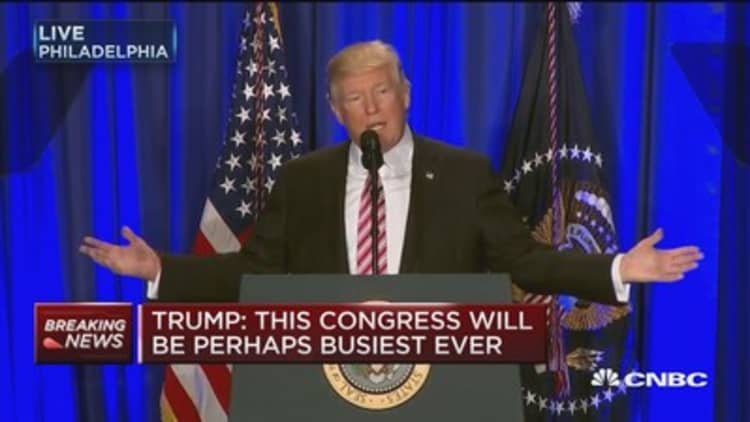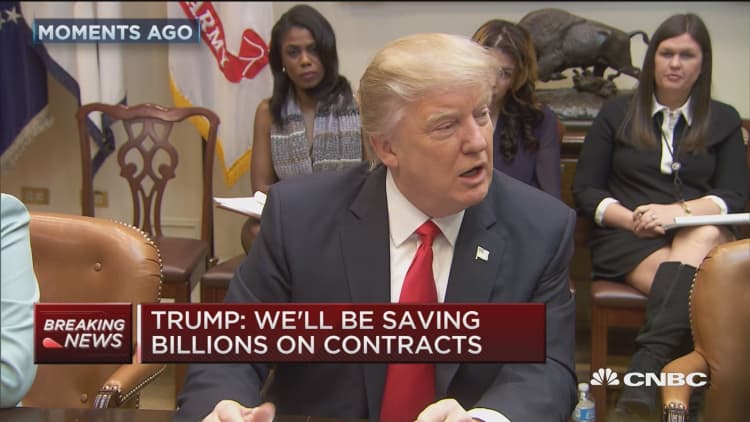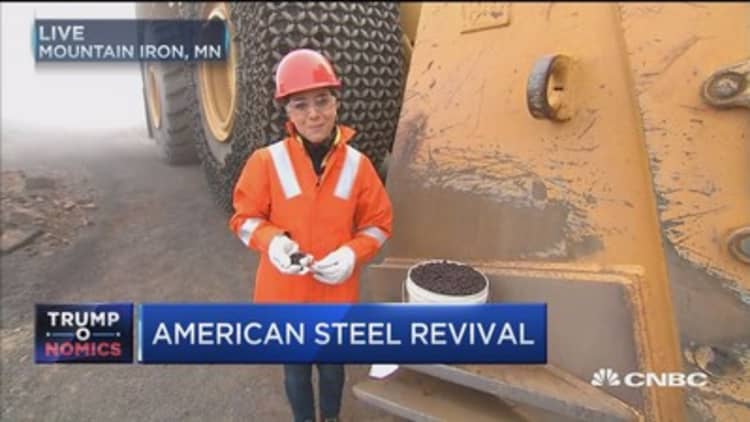"Made in America" week is coming to a close, but Commerce Secretary Wilbur Ross faces a deadline to deliver a blueprint for one of the administration's first manufacturing initiatives.
Given the tone of public comments on the proposed policy, the administration shouldn't expect a warm reception if it follows through with its original plan.
By Sunday, Ross is supposed to present President Donald Trump with a plan to require oil and gas pipeline makers to build and repair projects within U.S. borders with American-made pipes and raw materials. The plan is the result of a study Trump ordered in one of several presidential memos he signed during his first week in office.
The Commerce Department told CNBC it expects to deliver the plan on time. But while the idea attracted some support from steel makers during a public comment period, it also drew many warnings from industry groups, pipe manufacturers, energy companies and foreign governments.
"With global trade topping $20 trillion annually, the proliferation of such protectionist measures would only serve to jeopardize the ability of U.S. companies and their workers to sell goods and services to the 95 percent of the world's consumers who live outside our borders," the U.S. Chamber of Commerce said.

That tees up a potentially awkward roll out. Early in his presidency, Trump evoked the plan often and with great enthusiasm. He has repeatedly said the idea came to him in a moment of inspiration while he was reviewing planned memos authorizing two controversial pipeline projects.
Even before Ross began collecting input from stakeholders, Trump was floating his vision in public.
In his view, not only should pipeline builders use domestically manufactured pipes, but pipe makers should only buy raw steel from American mills. He suggested he'd enforce the mandate by refusing to exercise the government's power to appropriate private land on behalf of pipeline companies if they didn't buy American.
Warnings pile up
Some of the nation's top trading partners — the European Union, Canada, Mexico and Australia — raised concerns, including that the mandate would violate bedrock principles of free trade agreements and encourage other countries to protect their own manufacturing sectors with similar requirements.
The European Union reminded the Commerce Department that the United States and EU had partnered in the past to dissuade countries like China, India and Russia from implementing similar domestic manufacturing requirements.
Canada and Mexico both called the policy an "unprecedented intrusion" into companies' decision-making and noted that the North American steel industry is deeply interwoven. Canada said the executive action had created uncertainty and already delayed construction and hiring on both sides of the border.

Many pipe makers and the trade groups that represent them warned that the requirement could increase costs, disrupt supply chains, delay projects and restrict hiring. In dozens of pages of comments, industry associations argued that the mandate is largely unworkable without a lengthy phase-in period and substantial loopholes.
"Higher pipe prices from a domestic content requirement would threaten new pipeline projects and hurt creation of new U.S. jobs building pipelines. We want to ensure that any action to help Buy America does not hurt Hire America," John Stoody, vice president of government and public relations at the Association of Oil Pipe Lines, told CNBC this week.
National Fuel, a Williamsville, New York-based energy and utility company, warned that the requirement could cause big companies to place large orders for pipes and raw steel in anticipation of a shortage, sending prices higher. It suggested creating incentives, rather than a requirement, to use American products.
The Commerce Department told CNBC it declines "to comment on any issues or legal analysis until the report is issued."
Lukewarm support from steel makers
Among the strongest supporters were U.S.-based steel companies like Nucor. Many noted that while they do not currently make some of the products pipeline makers use, they have the capacity to start supplying them in coming years.
Still, some steel makers stopped short of a full-throated endorsement of Trump's plan, instead expressing support for policies that encourage — not require — sourcing steel from North America. That is perhaps because many steel makers have operations across borders.
As Canada pointed out: "Many steel facilities operating in both countries are subsidiaries of the same parent companies, including ArcelorMittal, Tenaris, Evraz, Harris Steel and others. In addition, most of our steelworkers are represented by the same union, the United Steelworkers."

The president has lately been less vocal about the plan, perhaps because he has been embroiled in Republican infighting over health-care reform, backlash over his firing of FBI Director James Comey and new revelations about his campaign's contacts with Russia-linked individuals.
Trump invoked the deal as recently as last month, but the administration has already carved out one big exception.
The White House conceded in March that TransCanada would not have to use American-made pipes and steel in its proposed Keystone XL pipeline. That is one of the two pipelines Trump was considering when he ostensibly came up with the Made in America requirement.


